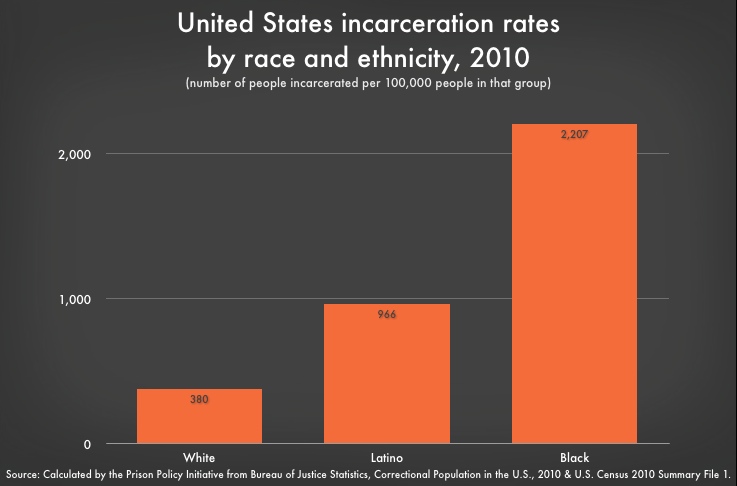Oregon passes legislation to rein in racial disparities in criminal law; which state will be next?
Evaluating legislation before it is passed is the best way to avoid harmful racial disparities down the line.
by Leah Sakala, July 9, 2013
Last week Oregon made great strides towards racial justice when Governor Kitzhaber signed SB 463 into law, a bill that enables the legislature to evaluate whether a bill or human service program is likely to lead to increased racial disparities. The bill, sponsored by Senator Chip Shields and Representative Gallegos, passed both chambers with overwhelming bipartisan support.
This law gives legislators the tools they need to be able to avoid passing legislation that unintentionally increases racial inequality. It has two different provisions:
- Any two legislators, as long as they are from different parties, can ask the Oregon Criminal Justice Commission to evaluate proposed legislation or ballot measures and issue a statement on the expected impact on racial disparities. For ballot measures, the statement must also be printed in voter information pamphlets.
- State agencies awarding grants for juvenile court or child welfare services must require grant applicants to include racial impact statements in their applications.
This bill is designed to foster informed criminal justice policymaking. Preparing racial impact statements for proposed legislation means that policymakers and voters can consider the larger impact of a bill before it is passed, rather than discovering any racially disparate consequences only after the damage has been done.
Prospective evaluations of racial impact are especially critical in the criminal justice context. The U.S. prison system is infamous for perpetuating fundamental racial inequalities. Nationally, Black people are incarcerated nearly six times as much as White people are, and Latinos are incarcerated nearly three times as much as Whites:
The racial disparities on the state level, too, are stark. In Oregon, for example, Black people make up 1.6% of the total population but more than 9% of the prison population. Latinos are 9% of the total population, but more than 13% of the prison population.
It’s impossible pinpoint a single reason for such stark racial inequality, but social scientists generally point to a complex combination of social disparities, policy decisions and systemic biases. Racial impact statements are a preventative measure to ensure that at least one critical factor in that equation — policy decisions — doesn’t unintentionally make things worse.
Not only are racial impact statement policies good for racial justice, but ensuring that bills are likely to do only what they are intended to do is just plain smart government policy. As SB 463 sponsor Rep. Gallegos said, “racial and ethnic disparities suggest that we are using state resources inefficiently and ineffectively.”
Bills like Oregon’s help policymakers:
- Ensure that legislation is narrowly targeted to have its intended effect.
- Consider the full impact of a measure before it is enacted.
- Avoid the expensive and time-consuming process of adapting existing legislation after the fact to remove unintended harm.
- Reduce the chances that new criminal justice policy in Oregon will increase the state’s significant racial disparities in the incarcerated population.
Oregon’s new law makes good common sense, but Oregon is only the third state to pass racial impact legislation, following on the heels of Iowa and Connecticut. It’s time for the rest of the states to join them.
We’ve been working on a comprehensive research review in order to help more states adopt similar racial impact statement policies. We aim to make two main contributions to the discourse on these useful policy tools:
- Racial impact statements fit entirely within a long and respected tradition of legislators requesting experts to evaluate proposed legislation for unforeseen impacts. It’s very common, for example, for legislators to ask for information on how a proposed bill is likely to affect the budget or the environment. Our movement needs to properly situate racial impact statements in the broader arsenal of smart and common policymaking practices.
- We should use the data we already have to make racial impact statements as useful as possible. Beyond the three states with racial impact legislation, a number of other states routinely request similar racial impact evaluations as part of the legislative process. Each state’s procedure is different, from the conditions that have to be met before a request can be made, to the nature of the information requested, to the time allocated for the request to be fulfilled. By doing a comprehensive review of current racial impact measures and how they are used, we can suggest best practices that will make similar legislation in other additional states as effective as possible.
The criminal justice system is at a crossroads right now, and evaluating legislation before it is passed is the best way to avoid harmful racial disparities down the line. By establishing that racial impact statements are a common-sense tool for rational policymaking, and giving lawmakers some clear best practice guidelines, we can pave the way for more states to follow Oregon’s lead.
But we need financial support to bring this project forward.
If you can support this research project to help bring racial justice to criminal justice in more states, or know of anyone who can, please get in touch.
And congratulations to Oregon!





Would like the next state to be Texas